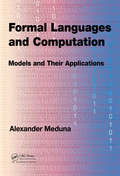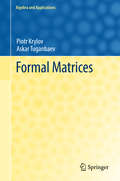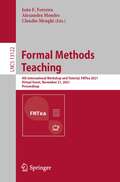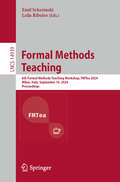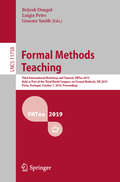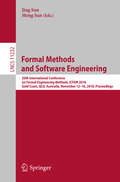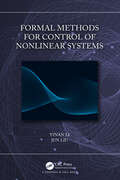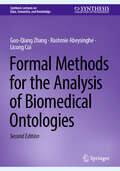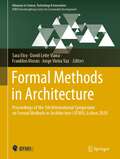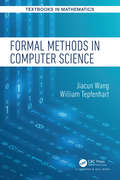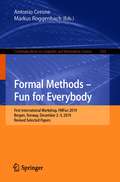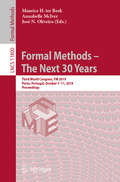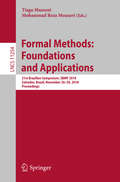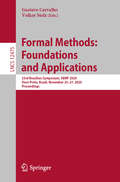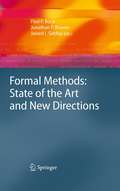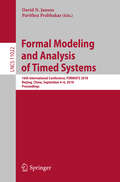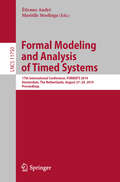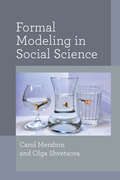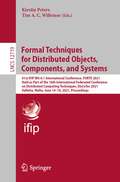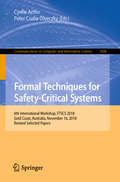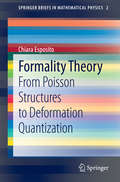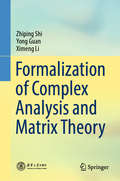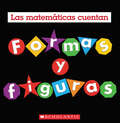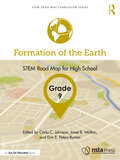- Table View
- List View
Formal Languages and Computation: Models and Their Applications
by Alexander MedunaFormal Languages and Computation: Models and Their Applications gives a clear, comprehensive introduction to formal language theory and its applications in computer science. It covers all rudimental topics concerning formal languages and their models, especially grammars and automata, and sketches the basic ideas underlying the theory of computatio
Formal Matrices
by Piotr Krylov Askar TuganbaevThis monograph is a comprehensive account of formal matrices, examining homological properties of modules over formal matrix rings and summarising the interplay between Morita contexts and K theory. While various special types of formal matrix rings have been studied for a long time from several points of view and appear in various textbooks, for instance to examine equivalences of module categories and to illustrate rings with one-sided non-symmetric properties, this particular class of rings has, so far, not been treated systematically. Exploring formal matrix rings of order 2 and introducing the notion of the determinant of a formal matrix over a commutative ring, this monograph further covers the Grothendieck and Whitehead groups of rings. Graduate students and researchers interested in ring theory, module theory and operator algebras will find this book particularly valuable. Containing numerous examples, Formal Matrices is a largely self-contained and accessible introduction to the topic, assuming a solid understanding of basic algebra.
Formal Methods Teaching: 4th International Workshop and Tutorial, FMTea 2021, Virtual Event, November 21, 2021, Proceedings (Lecture Notes in Computer Science #13122)
by João F. Ferreira Alexandra Mendes Claudio MenghiThis book constitutes the refereed proceedings of the 4th International Workshop and Tutorial, FMTea 2021, Held as Part of the 4th World Congress on Formal Methods, FM 2021, as a virtual event in November 2021. The 8 full papers presented together with 2 short papers were carefully reviewed and selected from 12 submissions. The papers are organized in topical sections named: experiences and proposals related with online FM learning and teaching, integrating/embedding FM teaching/thinking within other computer science courses, teaching FM for industry, and innovative learning and teaching methods for FM.
Formal Methods Teaching: 6th Formal Methods Teaching Workshop, FMTea 2024, Milan, Italy, September 10, 2024, Proceedings (Lecture Notes in Computer Science #14939)
by Leila Ribeiro Emil SekerinskiThis book constitutes the proceedings of the 6th International Workshop on Formal Methods Teaching, FMTea 2024, which was held in Milan, Italy, on September 10, 2024. The 7 full papers included in these proceedings were carefully reviewed and selected from 9 submissions. The book also contains one invited talk in full paper length. The papers focus on learning formal methods for the purpose of teaching and self-learning.
Formal Methods Teaching: Third International Workshop and Tutorial, FMTea 2019, Held as Part of the Third World Congress on Formal Methods, FM 2019, Porto, Portugal, October 7, 2019, Proceedings (Lecture Notes in Computer Science #11758)
by Graeme Smith Brijesh Dongol Luigia PetreThis book constitutes the refereed proceedings of the Third International Workshop and Tutorial, FMTea 2019, Held as Part of the Third World Congress on Formal Methods, FM 2019, Porto, Portugal, October 2019. The 14 full papers presented together with 3 abstract papers were carefully reviewed and selected from 22 submissions. The papers are organized in topical sections named: Tutorial lectures; Teaching Program Verification; Teaching Program Development; and Effective Teaching Techniques.
Formal Methods and Software Engineering: 20th International Conference on Formal Engineering Methods, ICFEM 2018, Gold Coast, QLD, Australia, November 12-16, 2018, Proceedings (Lecture Notes in Computer Science #11232)
by Jing Sun Meng SunThis book constitutes the refereed proceedings of the 20th International Conference on Formal Engineering Methods, ICFEM 2018, held in Gold Coast, QLD, Australia, in November 2018. The 22 revised full papers presented together with 14 short papers were carefully reviewed and selected from 66 submissions. The conference focuses on all areas related to formal engineering methods, such as verification; network systems; type theory; theorem proving; logic and semantics; refinement and transition systems; and emerging applications of formal methods.
Formal Methods for Control of Nonlinear Systems
by Jun Liu Yinan LiFormal methods is a field of computer science that emphasizes the use of rigorous mathematical techniques for verification and design of hardware and software systems. Analysis and design of nonlinear control design plays an important role across many disciplines of engineering and applied sciences, ranging from the control of an aircraft engine to the design of genetic circuits in synthetic biology. While linear control is a well-established subject, analysis and design of nonlinear control systems remains a challenging topic due to some of the fundamental difficulties caused by nonlinearity. Formal Methods for Control of Nonlinear Systems provides a unified computational approach to analysis and design of nonlinear systems. Features Constructive approach to nonlinear control. Rigorous specifications and validated computation. Suitable for graduate students and researchers who are interested in learning how formal methods and validated computation can be combined together to tackle nonlinear control problems with complex specifications from an algorithmic perspective. Combines mathematical rigor with practical applications.
Formal Methods for the Analysis of Biomedical Ontologies (Synthesis Lectures on Data, Semantics, and Knowledge)
by Guo-Qiang Zhang Rashmie Abeysinghe Licong CuiThis book explores the application of formal methods, rooted in mathematics and logic, to the analysis and enhancement of biomedical ontologies. The authors take a pragmatic approach focused on generating actionable insights to achieve high-quality codified biomedical knowledge in the most active and impactful areas where ontologies have a direct real-world impact. The book first introduces simple, yet formalized strategies for discovering undesired and incoherent patterns in ontologies before exploring the application of formal concept analysis for semantic completeness. The authors then discuss formal concept analysis as an ontological engineering principle. The book goes on to highlight the power and utility of uncovering non-lattice structure for debugging ontologies. This Second Edition includes a new chapter that covers recent research on leveraging logical definitions for identifying ontological defects. The authors have also added a new chapter on the perspective of using large language models in the ontological analysis work.
Formal Methods in Architecture: Proceedings of the 5th International Symposium on Formal Methods in Architecture (5FMA), Lisbon 2020 (Advances in Science, Technology & Innovation)
by Sara Eloy David Leite Viana Franklim Morais Jorge Vieira VazThis edited book gathers research studies presented at the 5th International Symposium on Formal Methods in Architecture (5FMA), Lisbon 2020. Studies focus on the use of methodologies, especially those that have witnessed recent developments, that stem from the mathematical and computer sciences and are developed in a collaborative way with architecture and related fields. This book constitutes a contribution to the debate and to the introduction of new methodologies and tools in the mentioned fields that derive from the application of formal methods in the creation of new explicit languages for problem-solving in architecture and urbanism. It adds valuable insight into the development of new practices solving identified societal problems and promoting the digital transformation of institutions in the mentioned fields. The primary audience of this book will be from the fields of architecture, urban planning, civil engineering, AEC, landscape design, computer sciences and mathematics, both academicians and professionals.
Formal Methods in Computer Science (Textbooks In Mathematics Ser.)
by Jiacun WangThis textbook gives students a comprehensive introduction to formal methods and their application in software and hardware specification and verification. It has three parts: The first part introduces some fundamentals in formal methods, including set theory, functions, finite state machines, and regular expressions. The second part focuses on logi
Formal Methods – Fun for Everybody: First International Workshop, FMFun 2019, Bergen, Norway, December 2–3, 2019, Revised Selected Papers (Communications in Computer and Information Science #1301)
by Antonio Cerone Markus RoggenbachThis volume constitutes the post-workshop proceedings of the First International Workshop on Formal Methods – Fun for Everybody, FMFun 2019, held in Bergen, Norway, in December 2019.The 7 revised full papers and 2 revised short papers presented in this volume were carefully reviewed and selected from 15 submissions. A white paper and two keynote papers are also included. The papers explore ways of utilizing the pathway to transforming and spreading formal methods. The vision of this workshop series is that formal methods ought to be taught in such a way that every student can have fun with it.
Formal Methods – The Next 30 Years: Third World Congress, FM 2019, Porto, Portugal, October 7–11, 2019, Proceedings (Lecture Notes in Computer Science #11800)
by Maurice H. ter Beek Annabelle McIver José N. OliveiraThis book constitutes the refereed proceedings of the 23rd Symposium on Formal Methods, FM 2019, held in Porto, Portugal, in the form of the Third World Congress on Formal Methods, in October 2019. The 44 full papers presented together with 3 invited presentations were carefully reviewed and selected from 129 submissions. The papers are organized in topical sections named: Invited Presentations; Verification; Synthesis Techniques; Concurrency; Model Checking Circus; Model Checking; Analysis Techniques; Specification Languages; Reasoning Techniques; Modelling Languages; Learning-Based Techniques and Applications; Refactoring and Reprogramming; I-Day Presentations.
Formal Methods: 21st Brazilian Symposium, SBMF 2018, Salvador, Brazil, November 26–30, 2018, Proceedings (Lecture Notes in Computer Science #11254)
by Mohammad Reza Mousavi Tiago MassoniThis book constitutes the refereed proceedings of the 21st Brazilian Symposium on Formal Methods, SBMF 2018, which took place in Salvador, Brazil, in November 2018.The 16 regular papers presented in this book were carefully reviewed and selected from 30 submissions. The papers are organized in topical sections such as: techniques and methodologies; specification and modeling languages; theoretical foundations; verification and validation; experience reports regarding teaching formal methods; and applications.Chapter “TeSSLa: Temporal Stream-Based Specification Language” is available open access under a Creative Commons Attribution 4.0 International License via link.springer.com.
Formal Methods: 23rd Brazilian Symposium, SBMF 2020, Ouro Preto, Brazil, November 25–27, 2020, Proceedings (Lecture Notes in Computer Science #12475)
by Volker Stolz Gustavo CarvalhoThis book constitutes the refereed proceedings of the 23rd Brazilian Symposium on Formal Methods, SBMF 2020, which was supposed to take place in Ouro Preto, Brazil, in November 2020. Instead the symposium took place virtually due to the COVID-19 pandemic. The 10 regular papers presented together with 3 invited talks in this book were carefully reviewed and selected from 17 submissions. The papers are organized in topical sections such as: experience reports; models, languages and semantics; and software product lines.Chapter ‘Safety Assurance of a High Voltage Controller for an Industrial Robotic System’ is available open access under a Creative Commons Attribution 4.0 International License via link.springer.com.
Formal Methods: State of the Art and New Directions
by Jawed Siddiqi Paul Boca Jonathan P. BowenThe last decade has witnessed a modest but sustained increase in researching and applying formal methods. A number of well cited success stories are now available and provide strong evidence that formal methods can be effective and deployed in industrial-scale applications. Through fundamental contributions from leading researchers, this book provides further evidence of the use of formal methods in the areas of requirements, design, modelling and implementation, verification and validation. The self-contained chapters are views from experts in these areas, providing readers with rich background information and a diverse breadth of specialist material. This authoritative collection of views provides a snapshot of the field and will be of considerable interest to researchers and professionals seeking a perspective on fundamental underpinnings of formal methods and current hot topics in the field. The following website www.fmsand.info is associated with the book.
Formal Modeling and Analysis of Timed Systems: 16th International Conference, FORMATS 2018, Beijing, China, September 4–6, 2018, Proceedings (Lecture Notes in Computer Science #11022)
by Pavithra Prabhakar David N. JansenThis book constitutes the refereed proceedings of the 16th International Conference on Formal Modeling and Analysis of Timed Systems, FORMATS 2018, held in Beijing, China, in September 2018. The 14 papers presented in this volume were carefully reviewed and selected from 29 submissions. The papers are organized in the following topical sections: invited papers, temporal logics, distributed timed systems, behavioral equivalences, timed words, and continuous dynamical systems. The aim of FORMATS is to promote the study of fundamental and practical aspects of timed systems, and to bring together researchers from different disciplines that share interests in modeling and analysis of timed systems and, as a generalization, hybrid systems.
Formal Modeling and Analysis of Timed Systems: 17th International Conference, FORMATS 2019, Amsterdam, The Netherlands, August 27–29, 2019, Proceedings (Lecture Notes in Computer Science #11750)
by Mariëlle Stoelinga Étienne AndréThis book constitutes the refereed proceedings of the 17th International Conference on Formal Modeling and Analysis of Timed Systems, FORMATS 2019, held in Amsterdam, The Netherlands, in August 2019.The 15 full papers and 2 short papers presented in this volume were carefully reviewed and selected from 42 submissions. The papers are organized in the following topical sections: special session on data-driven and stochastic approaches to real-time, including monitoring and Big Data; timed systems; linear and non-linear systems; timed automata; special session on timed systems and probabilities.
Formal Modeling in Social Science
by Carol Mershon Olga ShvetsovaA formal model in the social sciences builds explanations when it structures the reasoning underlying a theoretical argument, opens venues for controlled experimentation, and can lead to hypotheses. Yet more importantly, models evaluate theory, build theory, and enhance conjectures. Formal Modeling in Social Science addresses the varied helpful roles of formal models and goes further to take up more fundamental considerations of epistemology and methodology. The authors integrate the exposition of the epistemology and the methodology of modeling and argue that these two reinforce each other. They illustrate the process of designing an original model suited to the puzzle at hand, using multiple methods in diverse substantive areas of inquiry. The authors also emphasize the crucial, though underappreciated, role of a narrative in the progression from theory to model. Transparency of assumptions and steps in a model means that any analyst will reach equivalent predictions whenever she replicates the argument. Hence, models enable theoretical replication, essential in the accumulation of knowledge. Formal Modeling in Social Science speaks to scholars in different career stages and disciplines and with varying expertise in modeling.
Formal Models of Domestic Politics
by Scott GehlbachFormal Models of Domestic Politics offers the first unified and accessible treatment of canonical and important new formal models of domestic politics. Intended for students in political science and economics who have already taken a course in game theory, the text covers eight classes of models: electoral competition under certainty and uncertainty, special interest politics, veto players, delegation, coalitions, political agency, and regime change. Political economists, comparativists, and Americanists alike will find models here central to their research interests. The text assumes no mathematical knowledge beyond basic calculus, with an emphasis placed on clarity of presentation. Political scientists will appreciate the simplification of economic environments to focus on the political logic of models; economists will discover many important models of politics published outside of their discipline; and both instructors and students will value the numerous classroom-tested exercises.
Formal Techniques for Distributed Objects, Components, and Systems: 41st IFIP WG 6.1 International Conference, FORTE 2021, Held as Part of the 16th International Federated Conference on Distributed Computing Techniques, DisCoTec 2021, Valletta, Malta, June 14–18, 2021, Proceedings (Lecture Notes in Computer Science #12719)
by Kirstin Peters Tim A. C. WillemseThis book constitutes the refereed proceedings of the 41st IFIP WG 6.1 International Conference on Formal Techniques for Distributed Objects, Components, and Systems, FORTE 2021, held in Valletta, Malta, in June 2021, as part of the 16th International Federated Conference on Distributed Computing Techniques, DisCoTec 2021. The 9 regular papers and 4 short papers presented were carefully reviewed and selected from 26 submissions. They cover topics such as: software quality, reliability, availability, and safety; security, privacy, and trust in distributed and/or communicating systems; service-oriented, ubiquitous, and cloud computing systems; component-and model-based design; object technology, modularity, and software adaptation; self-stabilisation and self-healing/organising; and verification, validation, formal analysis, and testing of the above. Due to the Corona pandemic this event was held virtually.
Formal Techniques for Safety-Critical Systems: 6th International Workshop, FTSCS 2018, Gold Coast, Australia, November 16, 2018, Revised Selected Papers (Communications in Computer and Information Science #1008)
by Cyrille Artho Peter Csaba ÖlveczkyThis book constitutes the refereed proceedings of the 6th International Workshop on Formal Techniques for Safety-Critical Systems, FTSCS 2018, held in Gold Coast, Australia in November 2018.The 10 revised full papers presented together with an abstract of an invited talk were carefully reviewed and selected from 22 submissions. The papers are organized in topical sections on analysis and verification of Safety-Critical Systems; analysis of timed systems; semantics and analysis methods, and model transformation.
Formality Theory
by Chiara EspositoThis book is a survey of the theory of formal deformation quantization of Poisson manifolds, in the formalism developed by Kontsevich. It is intended as an educational introduction for mathematical physicists who are dealing with the subject for the first time. The main topics covered are the theory of Poisson manifolds, star products and their classification, deformations of associative algebras and the formality theorem. Readers will also be familiarized with the relevant physical motivations underlying the purely mathematical construction.
Formalization of Complex Analysis and Matrix Theory
by Yong Guan Zhiping Shi Ximeng LiThis book discusses the formalization of mathematical theories centering on complex analysis and matrix theory, covering topics such as algebraic systems, complex numbers, gauge integration, the Fourier transformation and its discrete counterpart, matrices and their transformation, inner product spaces, and function matrices. The formalization is performed using the interactive theorem prover HOL4, chiefly developed at the University of Cambridge. Many of the developments presented are now integral parts of the library of this prover.As mathematical developments continue to gain in complexity, sometimes demanding proofs of enormous sizes, formalization has proven to be invaluable in terms of obtaining real confidence in their correctness. This book provides a basis for the computer-aided verification of engineering systems constructed using the principles of complex analysis and matrix theory, as well as building blocks for the formalization of more involved mathematical theories.
Formas y Figuras (Math Counts, New and Updated)
by Henry PluckroseUna serie de libros para introducir a los lectores jovenes a conceptos matematicos fundamentales, ¡ahora en espanol!Triangulos, cuadrados, rectangulos, circulos y hexagonos son tipos de formas y figuras. Y son faciles de reconocer en nuestra vida diaria. Con ejemplos del mundo real, fotografias convincentes y textos inspiradores, ¡esta es la introduccion perfecta al concepto matematico de "formas y figuras" para los lectores mas jovenes!Sobre la serie: Publicada originalmente en los anos 90 y actualizada recientemente, esta revolucionaria serie superventas inicia a los ninos en el camino de aprender a comunicarse y razonar matematicamente.La base de las matematicas son las ideas, y estos libros se han desarrollado para que los ninos vean, hablen, toquen y experimenten con estas ideas. Las fotografias atractivas y el texto sencillo y directo, hacen de esta serie una herramienta perfecta para leer individualmente o en voz alta. Diez conceptos matematicos fundamentales, uno para cada libro de la serie, estan desarrollados de forma excelente, y ofrecen un apoyo curricular ideal. Esta serie es la mejor manera de iniciar el camino hacia el dominio de las matematicas.
Formation of the Earth, Grade 9: STEM Road Map for High School (STEM Road Map Curriculum Series)
by Carla C. Johnson Erin E. Peters-Burton Janet B. WaltonWhat if you could challenge your ninth graders to use geologic theory and standards of measurement to explore different epochs and time periods of the Earth’s formation? With this volume in the STEM Road Map Curriculum Series, you can! Formation of the Earth outlines a journey that will steer your students toward authentic problem solving while grounding them in integrated STEM disciplines. Like the other volumes in the series, this book is designed to meet the growing need to infuse real-world learning into K–12 classrooms. This interdisciplinary, three-lesson module uses project- and problem-based learning to help students investigate how Earth science professionals gather information and develop theories about the formation of the Earth and the processes taking place since the proliferation of humans. Working in teams, students will work to identify, define and describe the attributes scientists use to delineate Earth’s eras, periods, and epochs, in order to determine the appropriate boundary event to define the Anthropocene Epoch, and will develop a publication-ready textbook entry for an Earth science textbook. To support this goal, students will do the following: • Identify, define, and describe attributes of eras, periods, and epochs which have marked geologic time in Earth’s history. • Evaluate various possible index layers and boundary events that mark the beginning of the Anthropocene Epoch to determine which is most appropriate when labeling the current epoch in Earth’s history. • Design and present a multimedia presentation to share with textbook publishers regarding information on the Anthropocene Epoch, to include in a secondary-level Earth science textbook. • Create a publication-ready textbook entry describing the Anthropocene Epoch. The STEM Road Map Curriculum Series is anchored in the Next Generation Science Standards, the Common Core State Standards, and the Framework for 21st Century Learning. In-depth and flexible, Formation of the Earth can be used as a whole unit or in part to meet the needs of districts, schools, and teachers who are charting a course toward an integrated STEM approach.
